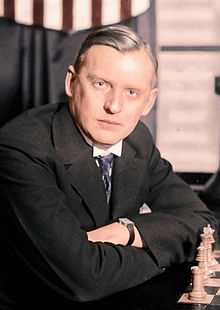Alexander Alekhine
Russian-French chess player (1892–1946)
Alexander Alexandrovich Alekhine (October 31 or November 1, 1892 – March 24, 1946) was a Russian-born naturalized French chess grandmaster (officially naturalized in 1927 only three days before the World Champion title), and the fourth World Chess Champion.

Quotes
edit- The fact that a player is very short of time is, to my mind, as little to be considered as an excuse as, for instance, the statement of the law-breaker that he was drunk at the moment he committed the crime.
- In: Chess Life, Vol. 16-18, 1961. p. 113.
- On the Zeitnot problem.
- I study chess eight hours a day, on principle.
- Attributed in: David Hooper, Kenneth Whyld (1996) The Oxford companion to chess. p. 8.
- Chess first of all teaches you to be objective.
- Quoted in: M. Yudovich, A. Kotov (2001) The Soviet School of Chess, p. 42.
- Chess for me is not a game, but an art. Yes, and I take upon myself all those responsibilities which an art imposes on its adherents.
- Quoted in: Daniel James Brooks (2013) Poetics. Book 1, p. 72.
Disputed
edit- During a chess competition a chess master should be a combination of a beast of prey and a monk.
- Attributed to Alekhine in page 11 of Essential Chess Quotations by John C. Knudsen (Falls Church, 1998), per Edward Winter[1]
- This quotation and many variants of it are commonly attributed to Alekhine however per Winter "with regard to Alekhine there has been no primary source".
- Attributed to Alekhine in page 11 of Essential Chess Quotations by John C. Knudsen (Falls Church, 1998), per Edward Winter[1]
About Alexander Alekhine
edit- It was impossible to win against Capablanca; against Alekhine it was impossible to play.
- Paul Keres, quoted in: Bruce Pandolfini (1992) Pandolfini's Chess Complete: The Most Comprehensive Guide. p. 208.
- Capablanca was the greatest talent, but Alekhine was the greatest in his achievements.
- Mikhail Botvinnik, quoted in: Chess, Vol. 52, Nr. 1003-1018, 1987, p. 184.
- In playing through an Alekhine game one suddenly meets a move which simply takes one's breath away.
- Conel Hugh O'Donel Alexander, quoted in: Alexander Alekhine (1972) My Best Games of Chess, 1924-1937: . 1938-1945. p. 12.
- Alekhine's attacks came suddenly, like destructive thunderstorms that erupted from a clear sky.
- Garry Kasparov; Quoted in: Raymond Keene (1999) Keene on Chess, p. 243.
- I can comprehend Alekhine's combinations well enough; but where he gets his attacking chances from and how he infuses such life into the very opening - that is beyond me.
- Rudolf Spielmann in: Fred Reinfeld (1956) Why You Lose at Chess, p. 160.
- Alekhine is a poet who creates a work of art out of something that would hardly inspire another man to send home a picture post card.
- Max Euwe, in: Fred Reinfeld (1956) Why You Lose at Chess, p. 180.
- Fortune favors the bold, especially when they are Alekhine.
- Lodewijk Prins, in: Chess Review, Vol. 19-20 (1952).